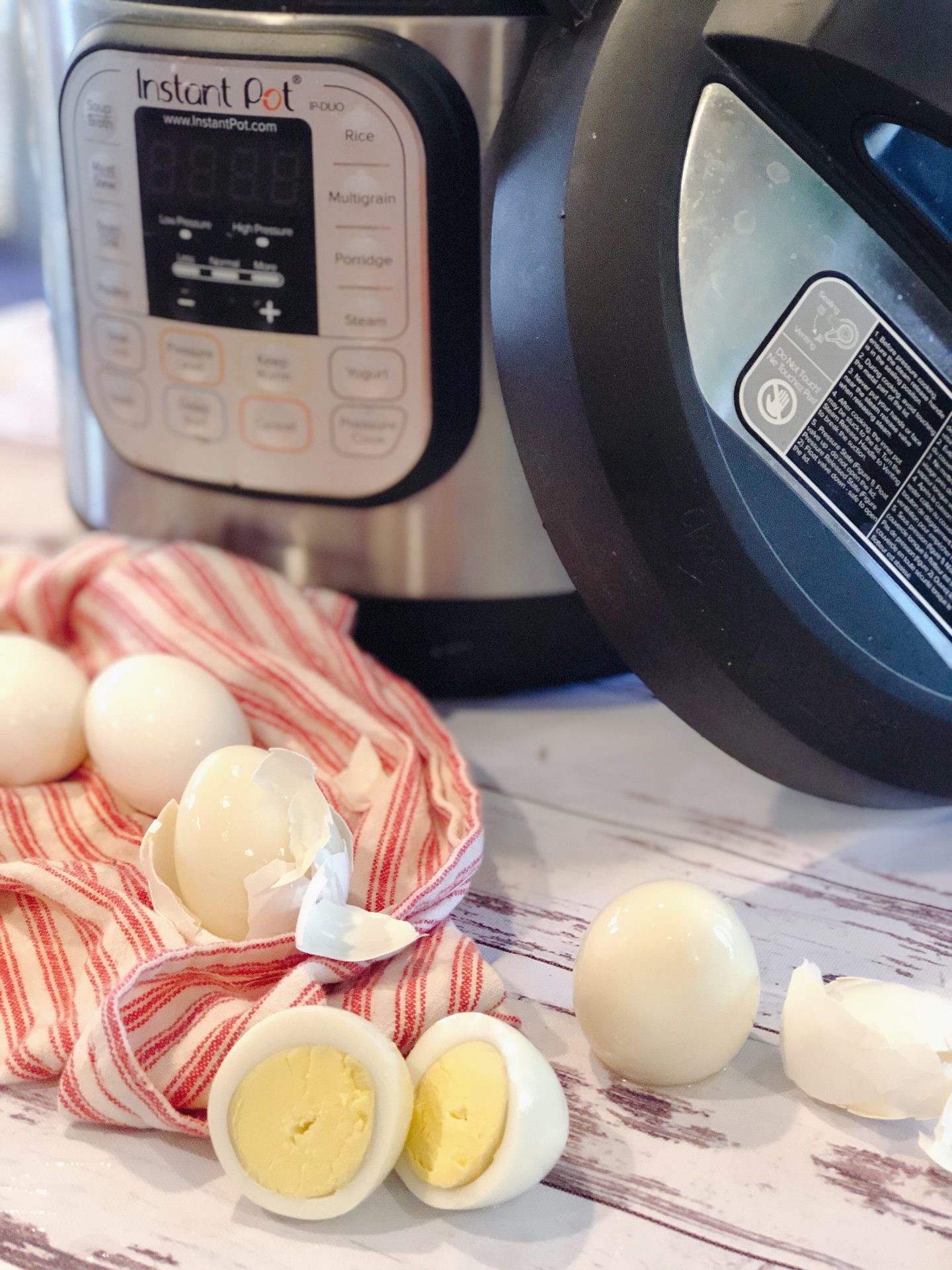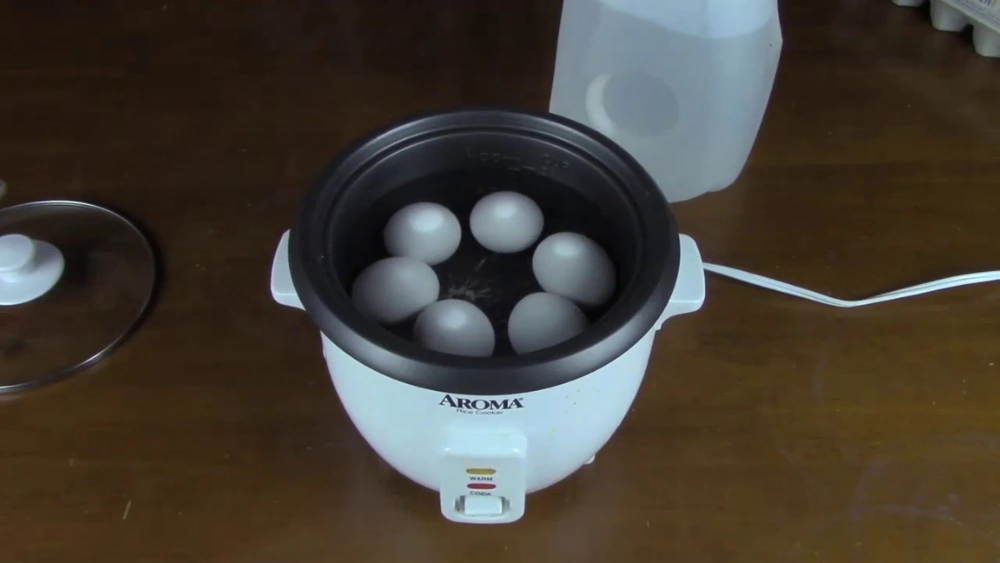Have you ever wondered if you can make hard boiled eggs in a rice cooker? If you’re tired of watching the stove and guessing cooking times, this simple trick could change the way you prepare eggs forever.
Imagine having perfectly cooked eggs without any fuss or extra pots to clean. Keep reading, because you’re about to discover an easy, foolproof method that saves you time and effort in the kitchen. Your next batch of hard boiled eggs might just come from your rice cooker!

Credit: www.farmwifefeeds.com
Why Use A Rice Cooker
Using a rice cooker to make hard boiled eggs offers a fresh approach to a kitchen classic. This method simplifies the process and often leads to better results. Rice cookers maintain consistent heat, which helps cook eggs evenly. They also free up stove space and reduce the need to watch the pot. This makes them a handy tool for anyone who wants a quick and easy way to boil eggs.
Benefits Over Traditional Methods
- No need to watch the pot closely.
- Less chance of overcooking or undercooking eggs.
- Easy cleanup as the rice cooker bowl is non-stick.
- Uses less water compared to boiling on a stove.
- Works well even in small kitchens or dorm rooms.
Consistency And Convenience
Rice cookers deliver steady heat without sudden changes. This ensures eggs cook evenly every time. You can set it and forget it, freeing your time for other tasks. The automatic shut-off feature prevents eggs from cooking too long. This convenience makes rice cookers a reliable choice for busy mornings or meal prep.
Credit: www.tiktok.com
Choosing The Right Rice Cooker
Choosing a rice cooker with a steamer basket makes boiling eggs easy. Many rice cookers heat evenly, ensuring perfectly hard boiled eggs every time. This appliance saves time and effort in the kitchen.
Choosing the right rice cooker is essential for making perfect hard boiled eggs. Not all rice cookers are created equal, and selecting one that suits your needs can make all the difference. Consider factors such as size, capacity, and special features.
Size And Capacity
The size of your rice cooker matters. A compact rice cooker is ideal for small kitchens or single servings. Larger models work well for families or batch cooking. Check the capacity in liters or cups. This ensures it fits your needs without wasting space.
Features To Look For
Some rice cookers offer programmable settings. These are great for customizing cooking times. Look for models with a steamer basket. This accessory helps boil eggs and steam veggies simultaneously. A keep-warm function is handy. It maintains the right temperature until serving. Consider a non-stick inner pot. It makes cleaning easier and prevents eggs from sticking. Choose wisely, and your rice cooker will become a versatile kitchen tool.
Preparing Eggs For Cooking
Preparing eggs properly is key to making perfect hard boiled eggs in a rice cooker. The right preparation affects texture and ease of peeling. Starting with good eggs and handling them well leads to better results. Follow simple tips to get ready before cooking.
Selecting Fresh Eggs
Choose eggs that are fresh but not too new. Eggs that are a few days old peel easier after cooking. Avoid eggs with cracks or dirt. Check the shell for smoothness and firmness. Fresh eggs also have a cleaner taste and better texture.
Room Temperature Tips
Bring eggs to room temperature before cooking. Cold eggs straight from the fridge might crack in hot water. Let eggs sit out for about 20 minutes. This step helps cook the eggs evenly. Room temperature eggs reduce the chance of breaks during cooking.
Step-by-step Cooking Process
Making hard boiled eggs in a rice cooker is surprisingly simple and efficient. The process saves you from watching a pot on the stove and frees up space for other cooking tasks. Here’s how you can master the technique with clear steps that ensure perfectly cooked eggs every time.
Water Measurement
The amount of water you add is crucial. Too little water can cause the eggs to cook unevenly, while too much will extend the cooking time unnecessarily.
Typically, pour about 1 cup (240 ml) of water into the rice cooker’s inner pot. This amount creates enough steam to cook the eggs thoroughly without submerging them, which is important to avoid cracking.
Setting The Timer
Setting the right cooking time depends on how hard you want your eggs. For hard boiled eggs, 12 to 15 minutes works well in most rice cookers.
If your rice cooker has a timer function, set it accordingly. Otherwise, use a kitchen timer or your phone to track the time once the cooker switches to the cooking mode.
Starting The Cooker
Place the eggs gently in the rice cooker’s inner pot, ensuring they are not stacked on top of each other. This prevents cracking and ensures even cooking.
Close the lid and start the cooker using the regular cooking or steam setting. You’ll notice steam building up inside – that’s the key to cooking your eggs perfectly.
Once the timer goes off, carefully remove the eggs and place them in cold water immediately. This stops the cooking process and makes peeling easier.
Cooling And Peeling Eggs
Cooling and peeling eggs after cooking them in a rice cooker is a crucial step that can make or break your experience. If you skip this, you might struggle with stubborn shells or overcooked yolks. Proper cooling not only stops the cooking process but also makes peeling easier and cleaner.
Ice Bath Method
Placing your eggs in an ice bath immediately after cooking is a game-changer. The cold water cools the eggs quickly, preventing the yolks from developing a greenish ring and keeping the texture just right.
Fill a large bowl with ice and cold water, then transfer your eggs directly from the rice cooker into the bath. Let them sit for at least 5 to 10 minutes. This sudden temperature drop also causes the egg white to contract slightly, making it easier to separate from the shell.
Easy Peeling Techniques
Peeling hard-boiled eggs can be frustrating if you don’t have a good technique. Try tapping the egg gently on a hard surface to crack the shell all around, then roll it lightly to loosen the shell further.
Peeling under running water or submerging the egg in water while peeling can help wash away tiny shell fragments and reduce sticking. Another trick is to peel from the wider end where the air pocket is—this often gives you a starting point for easier shell removal.
Troubleshooting Common Issues
Cooking hard boiled eggs in a rice cooker can be simple and quick. Sometimes, issues happen that affect the results. Knowing how to fix these common problems makes the process easier. This section covers common issues and tips to solve them.
Overcooked Or Undercooked Eggs
Eggs may become overcooked if left too long in the rice cooker. The yolks turn greenish and the texture gets rubbery. Short cooking times can cause undercooked eggs with runny yolks.
To avoid this, try these tips:
- Use the rice cooker’s timer to control cooking time.
- Start with room temperature eggs for even cooking.
- Test with one egg first to find the right time.
- Let eggs sit in hot water inside the cooker after cooking to finish gently.
Cracking During Cooking
Eggs sometimes crack while cooking in a rice cooker. Cracks cause white to leak out and make a mess. This happens if eggs hit the cooker’s sides or if the water boils too fast.
Prevent cracks by following these tips:
- Place eggs gently in the cooker using a spoon.
- Use enough water to cover eggs fully but not boil too hard.
- Add a little salt or vinegar to the water to help seal small cracks.
- Try cooking eggs on a lower heat setting if your rice cooker allows.
Creative Uses For Hard Boiled Eggs
Hard boiled eggs are more than just a quick protein fix. They bring versatility to your kitchen and can be transformed into a variety of tasty treats and meals. Once you master cooking them in a rice cooker, you’ll find countless ways to enjoy their convenience and flavor.
Simple Snacks
Hard boiled eggs make perfect grab-and-go snacks. You can sprinkle them with a pinch of salt and pepper or add a dash of hot sauce for a quick flavor boost. Ever tried slicing one on whole grain toast with a spread of avocado? It’s a satisfying snack that keeps you full longer.
Another idea is to make deviled eggs by mixing the yolks with mustard and a little mayo. They are easy to prepare in advance and always a hit at gatherings. Why not try dipping hard boiled eggs in hummus or your favorite dip for a different taste experience?
Salads And Meals
Hard boiled eggs elevate salads by adding texture and extra protein. Chop them into a classic Cobb salad or toss them with fresh greens, cherry tomatoes, and olives for a Mediterranean twist. You can even mix them with tuna or chicken salad to make the meal more filling.
Think beyond salads—hard boiled eggs can top ramen or be sliced over grain bowls with roasted veggies. Adding them to curry or fried rice creates a satisfying, balanced meal. How could you reinvent your usual dishes using hard boiled eggs as a key ingredient?
Credit: www.tiktok.com
Frequently Asked Questions
Can You Boil Eggs In A Rice Cooker?
Yes, you can boil eggs in a rice cooker. Use the steam or cook setting, add water, and cook for 10-15 minutes. This method is easy, convenient, and produces perfectly hard-boiled eggs without extra pots or pans.
How Long To Cook Hard Boiled Eggs In Rice Cooker?
Cook hard-boiled eggs in a rice cooker for about 10-15 minutes. Timing may vary based on your rice cooker model and egg size. Start with 12 minutes, then adjust to get your preferred yolk consistency.
Is Steaming Eggs In Rice Cooker Safe?
Yes, steaming eggs in a rice cooker is safe. It cooks eggs evenly and reduces cracking risks. Just ensure you use enough water and follow your rice cooker’s instructions for steaming.
Does Using A Rice Cooker Affect Egg Texture?
Using a rice cooker can result in evenly cooked eggs with a firm white and creamy yolk. The gentle steam heat helps prevent overcooking and rubbery textures found in stovetop boiling.
Conclusion
Making hard boiled eggs in a rice cooker is simple and quick. You only need water, eggs, and your rice cooker. The process saves time and avoids boiling water on the stove. Eggs come out easy to peel and cooked just right.
This method works well for busy mornings or meal prep. Give it a try and enjoy perfectly cooked eggs without extra fuss. Cooking eggs this way adds convenience to your kitchen routine. A small change with a big payoff.

